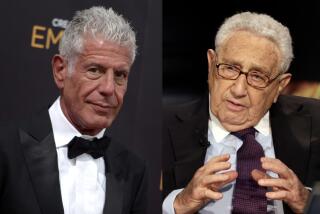J. Kingsbury-Smith; Honored Journalist
- Share via
Joseph Kingsbury-Smith, the Pulitzer Prize-winning journalist who gained exclusive interviews with generally secretive Soviet officials during the Cold War, has died.
Kingsbury-Smith died Wednesday at his home in a Virginia suburb of Washington. He was 90.
Born in New York, he started his 60-year career and long association with the Hearst chain in 1924, when his “desire for adventure” led to a job as a copy boy at Hearst national headquarters in New York. His first assignment was working at the Democratic National Convention. In his spare time he wrote “A Copy Boy’s View of the Political Convention,” which was published on Page 1 of the old New York World. That was the beginning of his writing career.
He rose through the ranks, holding a variety of editorial and administrative positions in New York, London and Washington, including chief diplomatic correspondent, chief foreign correspondent and national editor for all the Hearst newspapers, and publisher of the now-defunct New York Journal-American.
In 1946, he was the lone American press representative at the executions of 10 top Nazi leaders who had been convicted of war crimes by the Nuremberg tribunal. The lead to that story read:
Nuremberg, Oct. 16--Hermann Goering did not lead the last Nazi parade today--the one to the gallows. He lay dead in his cell by his own hand and Joachim von Ribbentrop took his place at the head of the march into eternity.
But Kingsbury-Smith was probably best known for his interviews with Soviet officials. His streak started in 1949 with an interview with Josef Stalin, which came against the backdrop of the blockade of Berlin. That encounter started as a series of questions written by Kingsbury-Smith and sent to the Hearst correspondent in Moscow to be passed on to the Kremlin.
“I received a response within 48 hours, and Stalin said he would be willing to discuss the [Berlin] problem,” Kingsbury-Smith said later. “So I sent another telegram and asked him if he would meet with Truman. I suggested Vienna or Geneva, and he suggested Warsaw. He said his doctors told him his heart wasn’t strong enough to travel.”
American officials took the information and moved toward solving the stalemate. Kingsbury-Smith won a George Polk Memorial Award for his efforts.
His Pulitzer came in 1956 for distinguished reporting of international affairs as a member of a three-man team that included William Randolph Hearst Jr. and Frank Conniff. The trio conducted a series of interviews with Nikita Khrushchev and other top Soviet leaders.
In the early ‘80s, Kingsbury-Smith had exclusive question-and-answer sessions with Soviet leader Yuri V. Andropov and his successor, Konstantin Chernenko, during Ronald Reagan’s first term as president when U.S.-Soviet relations were strained.
Kingsbury-Smith called his good fortune with Soviet leaders the result of “timing and enterprise. Also, it’s the fairness of my questions and accuracy in reporting them.
“I basically try to think of questions that would bring a positive response,” he said. “Not just propaganda, but a response that might be helpful.”
Asked once if he considered himself an expert on Soviet affairs, he responded: “Anyone who says he’s an expert on Russian affairs is a man likely to say he can drink three martinis and not feel the effect. There’s no such thing.”
Survivors include his wife, Eileen, two daughters, two grandchildren and two great-grandchildren.
More to Read
Sign up for Essential California
The most important California stories and recommendations in your inbox every morning.
You may occasionally receive promotional content from the Los Angeles Times.













